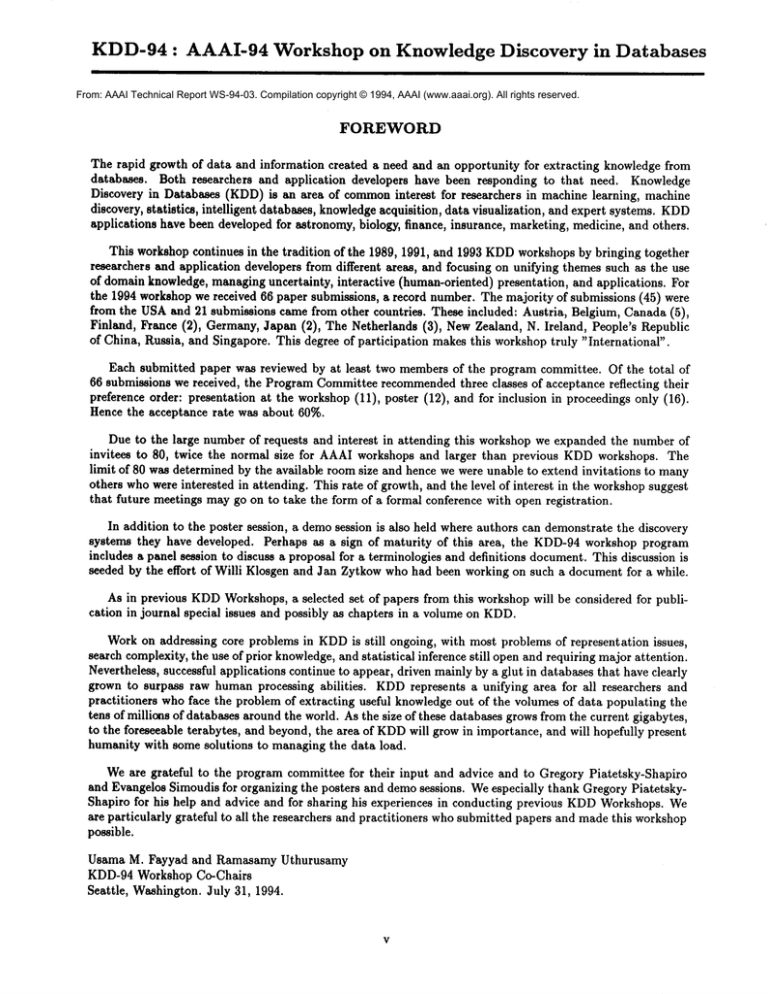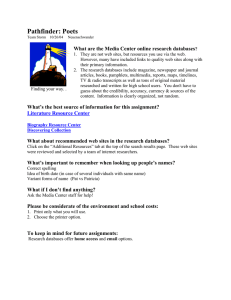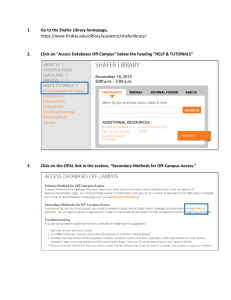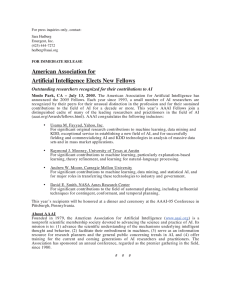
KDD-94 : AAAI-94
Workshop
on Knowledge
Discovery
in
Databases
From: AAAI Technical Report WS-94-03. Compilation copyright © 1994, AAAI (www.aaai.org). All rights reserved.
FOREWORD
The rapid growth of data and information created a need and an opportunity for extracting knowledge from
databases. Both researchers and application developers have been responding to that need. Knowledge
Discovery in Databases (KDD)is an area of commoninterest for researchers in machine learning, machine
discovery, statistics, intelligent databases, knowledgeacquisition, data visualization, and expert systems. KDD
applications have been developed for astronomy, biology, finance, insurance, marketing, medicine, and others.
This workshop continues in the tradition of the 1989, 1991, and 1993 KDDworkshops by bringing together
researchers and application developers from different areas, and focusing on unifying themes such as the use
of domain knowledge, managing uncertainty, interactive (human-oriented) presentation, and applications. For
the 1994 workshop we received 66 paper submissions, a record number. The majority of submissions (45) were
from the USAand 21 submissions came from other countries. These included: Austria, Belgium, Canada (5),
Finland, France (2), Germany, Japan (2), The Netherlands (3), NewZealand, N. Ireland, People’s Republic
of China, Russia, and Singapore. This degree of participation makes this workshop truly "International".
Each submitted paper was reviewed by at least two members of the program committee. Of the total of
66 submissions we received, the Program Committee recommendedthree classes of acceptance reflecting their
preference order: presentation at the workshop(11), poster (12), and for inclusion in proceedings only (16).
Hence the acceptance rate was about 60%.
Due to the large number of requests and interest in attending this workshop we expanded the number of
invitees to 80, twice the normal size for AAAIworkshops and larger than previous KDDworkshops. The
limit of 80 was determined by the available room size and hence we were unable to extend invitations to many
others whowere interested in attending. This rate of growth, and the level of interest in the workshopsuggest
that future meetings may go on to take the form of a formal conference with open registration.
In addition to the poster session, a demosession is also held where authors can demonstrate the discovery
systems they have developed. Perhaps as a sign of maturity of this area, the KDD-94workshop program
includes a panel session to discuss a proposal for a terminologies and definitions document. This discussion is
seeded by the effort of Willi Klosgen and Jan Zytkow who had been working on such a document for a while.
As in previous KDDWorkshops, a selected set of papers from this workshop will be considered for publication in journal special issues and possibly as chapters in a volume on KDD.
Workon addressing core problems in KDDis still ongoing, with most problems of representation issues,
search complexity, the use of prior knowledge,and statistical inference still open and requiring major attention.
Nevertheless, successful applications continue to appear, driven mainly by a glut in databases that have clearly
grown to surpass raw human processing abilities.
KDDrepresents a unifying area for all researchers and
practitioners who face the problem of extracting useful knowledgeout of the volumes of data populating the
tens of millions of databases around the world. As the size of these databases grows from the current gigabytes,
to the foreseeable terabytes, and beyond, the area of KDDwill grow in importance, and will hopefully present
humanity with some solutions to managing the data load.
Weare grateful to the program committee for their input and advice and to Gregory Piatetsky-Shapiro
and Evangelos Simoudis for organizing the posters and demo sessions. Weespecially thank Gregory PiatetskyShapiro for his help and advice and for sharing his experiences in conducting previous KDDWorkshops. We
are particularly grateful to all the researchers and practitioners whosubmitted papers and made this workshop
possible.
Usama M. Fayyad and Ramasamy Uthurusamy
KDD-94 Workshop Co-Chairs
Seattle, Washington. July 31, 1994.






